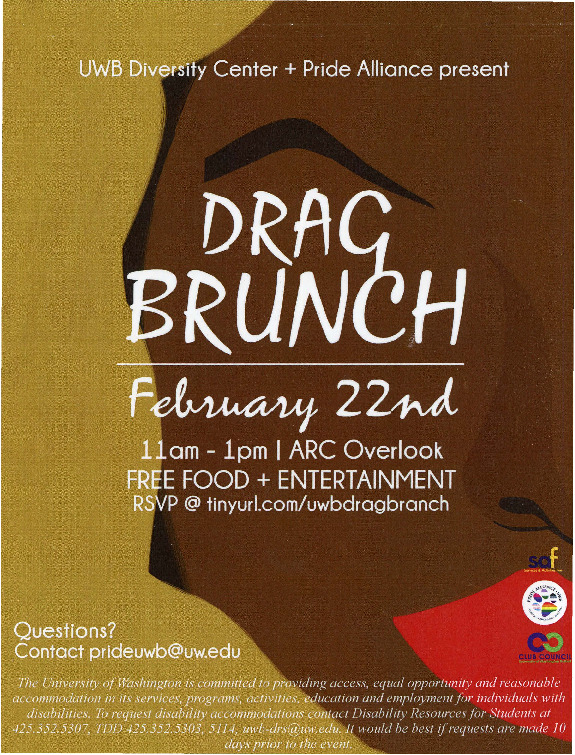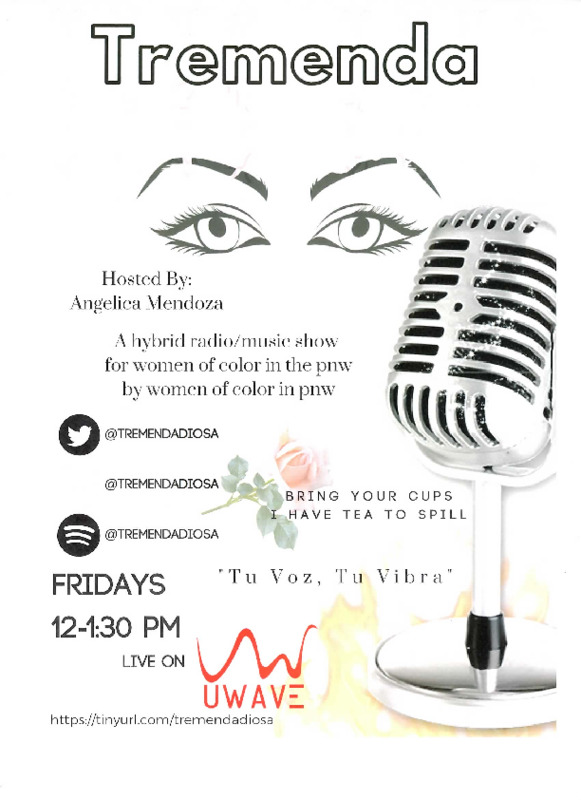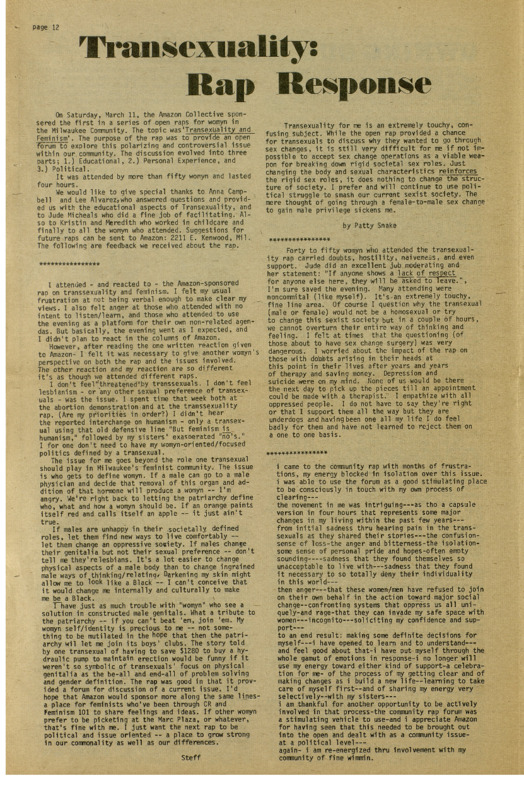Support For Marginalized Groups Through Music
Curated by Michelle Castro-Cuno (she/her).
In today's world, activism is seen as something that is usually done through protests and large gatherings with signs and chants. Through this exhibit, I hope to show that activism comes in many forms, especially in music. Musicians and performers can use their songs to spread a message supporting marginalized people such as those in the LGBTQ+ community and people of color.
The first example of this would be through a drag brunch hosted at University of Washington Bothell's campus. This flyer advertises free food as well as entertainment for two hours at the ARC Overlook. The diversity center at University of Washington Bothell and the Pride Alliance put together this event to show support for those in the LGBTQ+ community. An event like this creates a space where members of the LGBTQ+ community can feel safe, allies can come support, and potential allies can come to learn more.
Another example from the UWB campus is that of a radio show produced by Angelica Mendoza, a woman of color. Her show, Tremenda Diosa, has talk radio and music "for women of color in the pnw by women of color in the pnw". The flyer Mendoza created also has a Spanish phrase written on it, "tu voz, tu vibra", which means "your voice, your vibe". I think furthers the connection and support she is trying to create in the colored community.
Marc Sir Dane is a musician of Black and Indigenous heritage. The interviews provided give a detailed narrative of his life growing up as a gay man of color and how that affected him. He describes how different the gay community is in Savannah, Georgia where he was born and New York where he was as a teen and young adult. Marc Sir Dane most importantly shares his stories of participating in choir, theater, and producing his own music and how that was the place where he was able to be himself.
Lovari is a Latin gay musician who does similar things to Marc Sir Dane. The interview provided talks again about his experience growing up and being gay and how that affected him. Lovari discusses how he majored in music therapy and how using music as a therapeutic device is helpful. During the interview, Lovari speaks about how he sung the National Anthem during the LGBT flag raising and how his music style is inspiring for the Latinx and gay communities.
This photo of Luzviminda Carpenter is of them speaking at a Women Who Rock conference. The purpose of Women Who Rock is to provide support to transgender women, queer women, and anything in between. Spreading the message of Women Who Rock through this conference gets the information out to those who already support their cause and others who joined the meeting out of curiosity. Having a group like Women Who Rock speak about advocating for queer and trans rights helps those in the LGBTQ+ community feel seen, heard, and validated.
The trans performer Zeno Peterson talks about the experience with trans normativity and the limits of pronouns that can be troubling. Peterson takes a more optimistic view towards life and only notices what feels affirming. Through a musical, Peterson talks about the parallels between the experience of growing up rich versus the experience of Peterson's father who was poor. Peterson's approach to musical activism allows people to express their identity concerns and look at the more positive parts of being LGBTQ+ or of color.
Dioganhdih, a queer hip-hop artist, uses their music to tell the story of their identity and to explore their identity more thoroughly. During the interview, they described how they did not see any queer people in their community which motivated them to create music to give exposure to their community. Dioganhdih's music tells the story of queer and native people in a very "cutting edge" and in your face way that the community needs to get their voices heard.
A lot of what I have mentioned came from the last decade, but this newspaper clipping is from 1978. It discusses the responses to a series of raps about transexuality and feminism. Since this clipping comes from a time prior to the LGBTQ+ community becoming mainstream, the reactions of those who attended the meaning were internally conflicting because of the unknown nature of transexuality. What I think is important to take away from this clipping is that people were showing up to support the LGBTQ+ community even if it made them slightly uncomfortable.
In conclusion, music can be used by anybody as a form of activism to help marginalized groups feel included and safe. These eight individual artifacts show how different musicians and performers use their music to help spread awareness and support people of color and the LGBTQ+ community. I encourage you to take this information with you so you can understand the deeper meaning of some songs, so you can become an ally for the LGBTQ+ community and people of color, and maybe use music as your own form of activism.
Citations
Dioganhdih. “Interview with Dioganhdih,” Feminist Archive Exhibits, accessed March 7, 2022, https://uwb.ds.lib.uw.edu/feministarchiveexhibits/admin/items/show/171.
Macklin, Angelica. “Luzviminda Carpenter, Women Who Rock 2012 Conference, Washington Hall, March 2-3 2012,” Feminist Archive Exhibits, accessed March 7, 2022, https://uwb.ds.lib.uw.edu/feministarchiveexhibits/admin/items/show/166.
Peterson, Zeno. “Interview with Zeno Peterson,” Feminist Archive Exhibits, accessed March 7, 2022, https://uwb.ds.lib.uw.edu/feministarchiveexhibits/admin/items/show/170.
Satter, Beryl. “Marc Sir Dane,” Feminist Archive Exhibits, accessed March 7, 2022, https://uwb.ds.lib.uw.edu/feministarchiveexhibits/admin/items/show/168.
Scorsone, Kristyn. “* Lovari,” Feminist Archive Exhibits, accessed March 7, 2022, https://uwb.ds.lib.uw.edu/feministarchiveexhibits/admin/items/show/169.
Sue, Liz, Carole, Colleen, Spas, Terry. “Transexuality: Rap Response,” Feminist Archive Exhibits, accessed March 7, 2022, https://uwb.ds.lib.uw.edu/feministarchiveexhibits/admin/items/show/167.
UWAVE Radio, “Tremenda Diosa Flyer,” Feminist Archive Exhibits, accessed March 7, 2022, https://uwb.ds.lib.uw.edu/feministarchiveexhibits/admin/items/show/165.
UW Pride Alliance, “Drag Brunch Flyer,” Feminist Archive Exhibits, accessed March 7, 2022, https://uwb.ds.lib.uw.edu/feministarchiveexhibits/admin/items/show/164.
Archives
Feminist Community Archive of Washington



